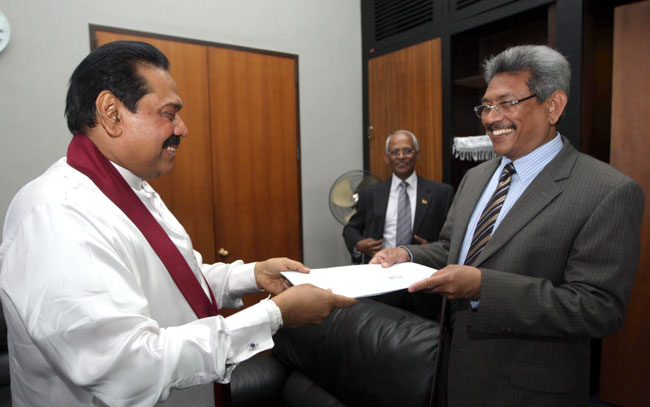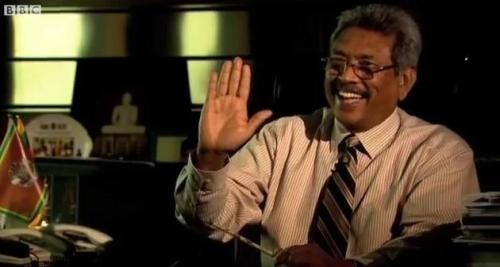Transfer of military’s role in civil affairs to elected council can promote reconciliation in the North
Reluctant
The government is continuing to give indications of its reluctance to establish a provincial council in the Northern Province with the devolved powers as provided by the 13th Amendment. The main concern articulated by government spokespersons has been the danger

Gotabaya Rajapaksa was reappointed as the Secretary to the Ministry of Defence on November 22, 2010. Photo shows President Mahinda Rajapaksa handing over the appointment letter to Gotabaya Rajapaksa at the Parliament Premises.
Secretary to the President Mr. Lalith Weeratunga also participated at the occasion. Photo tasken from Defence.lk
that a Tamil-led provincial council in the former war zone of the North might pose to national unity. This would account for the question being referred to the other eight provincial councils by the government, in which they are being asked to approve the dilution of their own powers as well as those of the soon-to-be-elected Northern Provincial Council. The ruling party headed by the President has taken the decision to proceed with the amending of the 13th Amendment. The only question remaining is when will the amendment be approved by Parliament and passed into law.
Gota wants continuing role for military in Sri Lanka
One of the most articulate spokespersons for the government position on the issue of the danger of too much devolution to the Tamil-majority Northern Province has been Defense Secretary Gotabaya Rajapaksa. He has also been the main proponent within the government of a continuing role for the military in post-war Sri Lanka. As a result of the prevalence of his view, there is an increasing role that is visible for the military in all parts of the country. Many achievements stand to the credit of his thinking, including the cleaning up, renovation of old landmark buildings and the greening of Colombo city, which would have been impossible without the induction of the military into these tasks. His views on what is good and bad for national unity will also be taken seriously within the country on account of the key role he played in the elimination of the LTTE and its threat to national unity.
Massive undertaking to rebuild after war
For the past four years the Sri Lankan military has played a major role in developing the economy of the Northern and Eastern provinces. After the war much of the North, in particular, was a wasteland. There was, and remains, an enormous task of rebuilding the physical

“One of the most articulate spokespersons for the government position on the issue of the danger of too much devolution to the Tamil-majority Northern Province has been Defense Secretary Gotabaya Rajapaksa”
infrastructure that was destroyed during the three decades of war. This massive effort could not have been undertaken by the private sector which has a short term and profit-oriented outlook. It was not realistic to expect the country’s under-capacitated private sector to accomplish the challenges of infrastructure development on its own. Therefore in the absence of an alternative, it was the Sri Lankan military that took up the challenge of speedily engaging in infrastructure development. It had and continues to have the disciplined manpower in sufficient numbers to undertake large infrastructure development projects.
Military contribution
There are many examples of military successes in achieving development targets. With its large number of military camps throughout the North and East, the military has the most readily available pool of manpower on the spot to do the job. The Defense Ministry website gives details of these activities. A major activity in which the military is involved in is the construction of houses. Soldiers of the Army, with funds from the Ministry of Resettlement, are constructing 165 houses in the first phase of the housing project in Keppapilavu village in Mullaitivu. As of today, 50 completed houses were handed over to the owners. At a special event, the Ministry of Resettlement laid foundation stones for 115 more houses. These houses will be built jointly by the community and the soldiers of the Sri Lanka Army, funded by the Ministry of Resettlement. The Ministry granted Rs. 300,000 for each family to build a house and construction work was carried out by the Sri Lanka Army with community participation. Many houses for the elderly, disabled people and single parent (mother only) families were completely built by the soldiers.
Military on the ground
The military personnel on the ground, who witnessed the sufferings of the people in the time of war, and witness to their poverty in the present, are often moved to sympathy, and are genuine in their efforts to uplift the people’s lives. However, this positive dimension of the military’s role in infrastructure building has not received the appreciation it might have by the beneficiary population and the international community, due to an entirely different factor. This is the role given to the military to overlook governance in the North and East. The government has appointed former military commanders who were in charge of military operations in the North and East during the time of the war to be governors of the Northern and Eastern provinces. The role of the military’s civil affairs offices, and powers given to local level military commanders in relation to civilian life, has created tensions with the civil population. The transition to peace in its fullest sense has not yet taken place in the North and East because the de-militarisation of civil administration has yet to take place.
Remarkable improvement
The issue of over-militarization of the Northern Province has loomed large in international and Tamil critiques of the existing state of affairs. The Lessons Learnt and Reconciliation Commission too, in its report of November 2011, called on the government to demilitarize the North and facilitate the return to civilian administration. On the positive side, it is noticeable that the presence of uniformed military personnel has been sharply reduced and in the town areas of the North it is barely to be seen. A recent UN Office for the Coordination of Humanitarian Affairs report (OCHA) states that they “observed a remarkable improvement in the districts in Northern and Eastern Province. The Government of Sri Lanka had provided good infrastructure development in many sectors including transportation, communication and health services. We also observed that there was no visible presence of armed military personnel in uniforms.”
Normalise governance
However, discussions with residents of the North will invariably reveal a belief in a military presence, which they feel is ubiquitous and also oppressive. They continue to report that there is a strong military presence that manifests itself now in the form of large numbers of intelligence personnel in civilian attire. There is a continued impression among the people that any gathering of several people needs to be informed to the military authorities, and that any seminar or discussion is likely to be attended by them or by informers. In addition, the military has established checkpoints and camps near peoples’ homes especially in the village areas. It is reported that military personnel frequently patrol these areas and the military’s intrusion into practically all aspects of civilian affairs remains a way of life. The government’s approach to reconciliation in the North cannot be successful on this basis as the dominant effect is to create a psychology of fear towards the security forces.
Too close for comfort
The dual role of the military is not appropriate to promoting reconciliation. The military’s role in facilitating the provision and building of major infrastructure projects will contribute to the upgrading of the economy of the North. But while this is important and necessary, there is also the need to address the issue of normalization of civilian life after war. The constant complaint of those who live in the North and East is that military intelligence personnel are ubiquitous in their lives, and the requirement of getting their approval for even private functions that people organize serves to dampen their sense of being normal and free to speak and organise as they wish. It also serves as a reminder that even four years after the war, normal civilian life and civilian administration has still not been restored. The UN (OCHA) report itself noted “The Security Apparatus is perceived to be too present or too close to people’s lives.”
Positive feature
In this context, the most positive feature of the present time is the government’s decision to hold the Northern Provincial Council elections. It offers the government an opportunity to normalize governance in the Northern Province and to transfer decision making powers to democratically elected authorities. It is evident that the government is facing considerable opposition from within its ranks in this regard due to concerns over national security and unity. But it is important that the elections take place as scheduled. These elections and the establishment of a provincial administration is an opportunity to the government to divest the military of their present role in governance. While the military can contribute to economic infrastructure building using its discipline and manpower, the restoration of true peace and reconciliation requires an empowered civil administration and a military that is back in barracks where governance is concerned.
